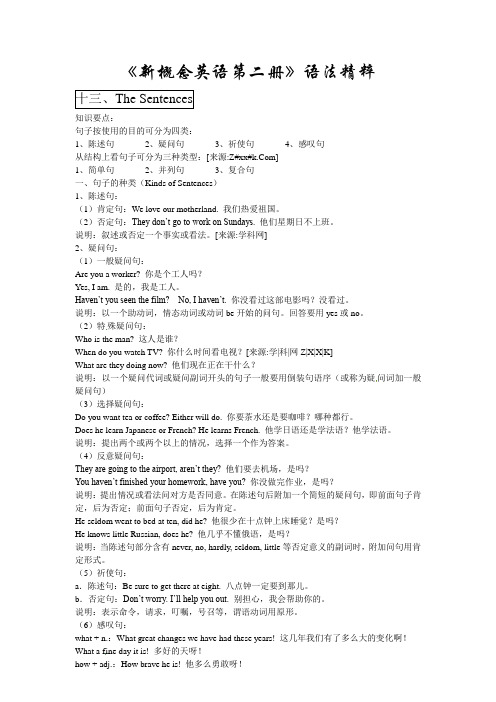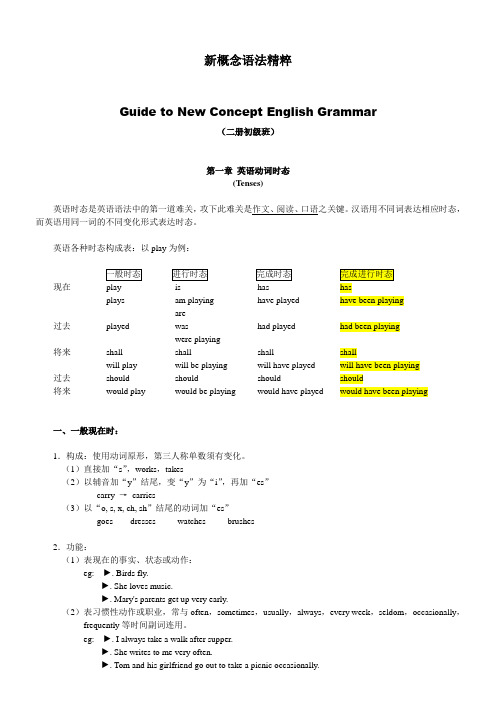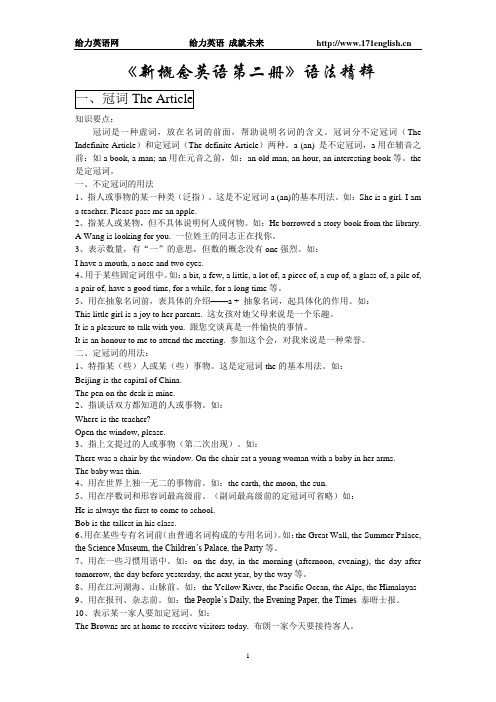《新概念英语》第二册语法精粹
- 格式:doc
- 大小:717.00 KB
- 文档页数:99

《新概念英语第二册》语法精粹十三、The Sentences知识要点:句子按使用的目的可分为四类:1、陈述句2、疑问句3、祈使句4、感叹句从结构上看句子可分为三种类型:[来源:Z#xx#]1、简单句2、并列句3、复合句一、句子的种类(Kinds of Sentences)1、陈述句:(1)肯定句:We love our motherland. 我们热爱祖国。
(2)否定句:They don’t go to work on Sundays. 他们星期日不上班。
说明:叙述或否定一个事实或看法。
[来源:学科网]2、疑问句:(1)一般疑问句:Are you a worker? 你是个工人吗?Yes, I am. 是的,我是工人。
Haven’t you seen the film? No, I haven’t. 你没看过这部电影吗?没看过。
说明:以一个助动词,情态动词或动词be开始的问句。
回答要用yes或no。
(2)特殊疑问句:Who is the man? 这人是谁?When do you watch TV? 你什么时间看电视?[来源:学|科|网Z|X|X|K]What are they doing now? 他们现在正在干什么?说明:以一个疑问代词或疑问副词开头的句子一般要用倒装句语序(或称为疑问词加一般疑问句)(3)选择疑问句:Do you want tea or coffee? Either will do. 你要茶水还是要咖啡?哪种都行。
Does he learn Japanese or French? He learns French. 他学日语还是学法语?他学法语。
说明:提出两个或两个以上的情况,选择一个作为答案。
(4)反意疑问句:They are going to the airport, aren’t they? 他们要去机场,是吗?You haven’t finished your homework, have you? 你没做完作业,是吗?说明:提出情况或看法问对方是否同意。


新概念英语第二册语法精粹及练习(一)新概念二册语法精粹一、一般现在时一、一般现在时:1.构成:使用动词原形,第三人称单数须有变化。
(1)直接加“s”,works,takes(2)以辅音加“y”结尾,变“y”为“i”,再加“es”,carry → carries(3)以“o, s, x, ch, sh”结尾的动词加“es”, goes dresses watches brushes2.功能:(1)表现在的事实、状态或动作:eg: Birds fly.She loves music.Mary's parents get up very early.(2)表习惯性动作或职业,常与often,sometimes,usually,always,every week,seldom,occasionally,frequently等时间副词连用。
eg: I always take a walk after supper.She writes to me very often.Tom and his girlfriend go out to take a picnic occasionally.(3)表客观真理,格言警句或事实:The earth moves round the sun.The sun rises in the east and sets in the west.Two and two makes four.No man but errs. 人非圣贤,熟能无过。
(4)表将来:A.在由when,after, before,as,as soon as,although,because,if,even if,in case,till,until,unless,so long as, where, whatever,wherever 等引导的状语从句中用一般现在时表将来发生的动作。
(黄金重点,所有考试都不放过它!)例如:I'll tell her when shecomes tomorrow.Even ifit rains this afternoon, I'll meet you.Whatever happens, you should keep cool-headed. (不错的句型,背下!!)I'll be right here waiting for you wherever you go.(很感人的句型!)B.按时间表示将要发生的动作或事件,用一般现在时表达将来时概念。

新概念语法精粹Guide to New Concept English Grammar(二册初级班)第一章 英语动词时态(Tenses)英语时态是英语语法中的第一道难关,攻下此难关是作文、阅读、口语之关键。
汉语用不同词表达相应时态,而英语用同一词的不同变化形式表达时态。
英语各种时态构成表:以play 为例:现在 play plays is am playing arehas have played have been playing过去 played was were playinghad played had been playing将来 shall will play shall will be playing shall will have played shallwill have been playing过去 将来 should would play should would be playing should would have played shouldwould have been playing一、一般现在时:1.构成:使用动词原形,第三人称单数须有变化。
(1)直接加“s ”,works ,takes(2)以辅音加“y ”结尾,变“y ”为“i ”,再加“es ”carry → carries(3)以“o, s, x, ch, sh ”结尾的动词加“es ”goes dresses watches brushes2.功能:(1)表现在的事实、状态或动作:eg: ►. Birds fly.►. She loves music.►. Mary's parents get up very early.(2)表习惯性动作或职业,常与often ,sometimes ,usually ,always ,every week ,seldom ,occasionally ,frequently 等时间副词连用。

《新概念英语第二册》语法精粹知识要点:冠词是一种虚词,放在名词的前面,帮助说明名词的含义。
冠词分不定冠词(The Indefinite Article)和定冠词(The definite Article)两种。
a (an) 是不定冠词,a用在辅音之前:如a book, a man; an用在元音之前,如:an old man, an hour, an interesting book等。
the 是定冠词。
一、不定冠词的用法1、指人或事物的某一种类(泛指)。
这是不定冠词a (an)的基本用法。
如:She is a girl. I ama teacher. Please pass me an apple.2、指某人或某物,但不具体说明何人或何物。
如:He borrowed a story-book from the library.A Wang is looking for you. 一位姓王的同志正在找你。
3、表示数量,有“一”的意思,但数的概念没有one强烈。
如:I have a mouth, a nose and two eyes.4、用于某些固定词组中。
如:a bit, a few, a little, a lot of, a piece of, a cup of, a glass of, a pile of,a pair of, have a good time, for a while, for a long time等。
5、用在抽象名词前,表具体的介绍——a + 抽象名词,起具体化的作用。
如:This little girl is a joy to her parents. 这女孩对她父母来说是一个乐趣。
It is a pleasure to talk with you. 跟您交谈真是一件愉快的事情。
It is an honour to me to attend the meeting. 参加这个会,对我来说是一种荣誉。

新概念语法精粹Guide to New Concept English Grammar(二册初级班)第一章 英语动词时态(Tenses)英语时态是英语语法中的第一道难关,攻下此难关是作文、阅读、口语之关键。
汉语用不同词表达相应时态,而英语用同一词的不同变化形式表达时态。
英语各种时态构成表:以play 为例:现在play plays is am playing arehas have played 过去played was were playinghad played had been playing 将来shall will play shall will be playing shall will have played shall will have been playing过去将来should would play should would be playing should would have played should would have been playing一、一般现在时:1.构成:使用动词原形,第三人称单数须有变化。
(1)直接加“s ”,works ,takes(2)以辅音加“y ”结尾,变“y ”为“i ”,再加“es ”carry → carries(3)以“o, s, x, ch, sh ”结尾的动词加“es ”goes dresses watches brushes2.功能:(1)表现在的事实、状态或动作:eg: ►. Birds fly.►. She loves music.►. Mary's parents get up very early.(2)表习惯性动作或职业,常与often ,sometimes ,usually ,always ,every week ,seldom ,occasionally ,frequently 等时间副词连用。
eg: ►. I always take a walk after supper.►. She writes to me very often.►. Tom and his girlfriend go out to take a picnic occasionally.(3►. The earth moves round the sun.►. The sun rises in the east and sets in the west.►. Two and two makes four.人非圣贤,熟能无过。
《新概念英语第二册》语法精粹(含习题):句子《新概念英语第二册》语法精粹知识要点:句子按使用的目的可分为四类:1、陈述句2、疑问句3、祈使句4、感叹句从结构上看句子可分为三种类型:1、简单句2、并列句3、复合句一、句子的种类(Kinds of Sentences)1、陈述句:(1)肯定句:We love our motherland. 我们热爱祖国。
(2)否定句:They don’t go to work on Sunday s. 他们星期日不上班。
说明:叙述或否定一个事实或看法。
2、疑问句:(1)一般疑问句:Are you a worker? 你是个工人吗?Yes, I am. 是的,我是工人。
Haven’t you seen the film? No, I haven’t. 你没看过这部电影吗?没看过。
说明:以一个助动词,情态动词或动词be开始的问句。
回答要用yes或no。
(2)特殊疑问句:Who is the man? 这人是谁?When do you watch TV? 你什么时间看电视?What are they doing now? 他们现在正在干什么?说明:以一个疑问代词或疑问副词开头的句子一般要用倒装句语序(或称为疑问词加一般疑问句)(3)选择疑问句:Do you want tea or coffee? Either will do. 你要茶水还是要咖啡?哪种都行。
Does he learn Japanese or French? He learns French. 他学日语还是学法语?他学法语。
说明:提出两个或两个以上的情况,选择一个作为答案。
(4)反意疑问句:They ar e going to the airport, aren’t they? 他们要去机场,是吗?You haven’t finished your homework, have you? 你没做完作业,是吗?说明:提出情况或看法问对方是否同意。
新概念英语第二册语法精粹第一章英语动词时态Tenses英语时态是英语语法中的第一首难关,攻下此难关是作文、阅读、口语之关键。
汉语用不同词表达相应时态,而英语用同一词的不同变化形式表达时态。
一、英语各种时态构成表:以play为例:一般时态进行时态完成时态完成进行时态现在play is has hasplays am playing have played have been playingare过去played was had played had been playingwere playing将来shall shall shall shallwill play will be playing will have played will have been playing过去should should should should将来would play would be playing would have played would have been playing二、一般现在时:1. 构成:使用动词原形,第三人称单数须有变化。
(1) 直接加“s”,works, takes(2) 以辅音加“y” 结尾,变“y” 为“i”, 再加“es”carry → carries(3) 以“o, s, x, ch, sh”结尾的动词加“es”goes dresses watches brushes2. 功能:(1) 表现在的事实、状态或动作:eg:Ø. Birds fly.Ø. She loves music.Ø. Mary’s parents get up very e arly.(2) 表习惯性动作或职业,常与often, sometimes, usually, always, every week, seldom, occasionally, frequently 等时间副词连用。
《新概念英语》第二册句子结构精粹汇总
讲解
《新概念英语》第二册中句子结构是研究英语语法中的重要内容。
这里是一些句子结构的精粹汇总:
1. 主语+谓语+间接宾语+直接宾语:I bought my friend a book.(我给朋友买了一本书。
)
2. 主语+be+形容词+(介词短语):The weather is beautiful.(天气很好。
)
3. 主语+be+名词(或形容词)+不定式:My dream is to be a doctor.(我的梦想是成为医生。
)
4. 主语+be+过去分词(形容词)+of+宾语:I am fond of music.(我喜欢音乐。
)
5. 主语+系动词+宾语补足语:He is a teacher.(他是一名教师。
)
6. 主语+谓语+to+宾语:I want to eat an apple.(我想吃一个苹果。
)
7. 主语+谓语+that/wh-从句:I know that you're right.(我知道你是对的。
)
8. 主语+谓语+if从句:If it rains, we'll stay inside.(如果下雨,我们就待在室内。
)
9. There be句型:There is a pen on the table.(桌子上有一支笔。
)
以上是一些《新概念英语》第二册中常用的句子结构。
学习这些结构可以帮助我们更好地掌握英语语法,提升英语水平。
新概念语法精粹Guide to New Concept English Grammar(二册初级班)第一章 英语动词时态(Tenses)英语时态是英语语法中的第一道难关,攻下此难关是作文、阅读、口语之关键。
汉语用不同词表达相应时态,而英语用同一词的不同变化形式表达时态。
英语各种时态构成表:以play 为例:现在play plays is am playing arehas have played 过去played was were playinghad played had been playing 将来shall will play shall will be playing shall will have played shall will have been playing过去将来should would play should would be playing should would have played should would have been playing一、一般现在时:1.构成:使用动词原形,第三人称单数须有变化。
(1)直接加“s ”,works ,takes(2)以辅音加“y ”结尾,变“y ”为“i ”,再加“es ”carry → carries(3)以“o, s, x, ch, sh ”结尾的动词加“es ”goes dresses watches brushes2.功能:(1)表现在的事实、状态或动作:eg: ►. Birds fly.►. She loves music.►. Mary's parents get up very early.(2)表习惯性动作或职业,常与often ,sometimes ,usually ,always ,every week ,seldom ,occasionally ,frequently 等时间副词连用。
eg: ►. I always take a walk after supper.►. She writes to me very often.►. Tom and his girlfriend go out to take a picnic occasionally.(3►. The earth moves round the sun.►. The sun rises in the east and sets in the west.►. Two and two makes four.人非圣贤,熟能无过。
《新概念英语第二册》语法精粹一、冠词The Article知识要点:冠词是一种虚词,放在名词的前面,帮助说明名词的含义。
冠词分不定冠词(The Indefinite Article)和定冠词(The definite Article)两种。
a (an) 是不定冠词,a用在辅音之前:如a book, a man; an用在元音之前,如:an old man, an hour, an interesting book等。
the是定冠词。
一、不定冠词的用法1、指人或事物的某一种类(泛指)。
这是不定冠词a (an)的基本用法。
如:She is a girl. I am a teacher. Please pass me an apple.2、指某人或某物,但不具体说明何人或何物。
如:He borrowed a story-book from the library.A Wang is looking for you. 一位姓王的同志正在找你。
3、表示数量,有“一”的意思,但数的概念没有one强烈。
如:I have a mouth, a nose and two eyes.4、用于某些固定词组中。
如:a bit, a few, a little, a lot of, a piece of, a cup of, a glass of, a pile of, a pair of, have a good time, for a while, for a long time等。
5、用在抽象名词前,表具体的介绍——a + 抽象名词,起具体化的作用。
如:This little girl is a joy to her parents. 这女孩对她父母来说是一个乐趣。
It is a pleasure to talk with you. 跟您交谈真是一件愉快的事情。
It is an honour to me to attend the meeting. 参加这个会,对我来说是一种荣誉。
二、定冠词的用法:1、特指某(些)人或某(些)事物。
这是定冠词the的基本用法。
如:Beijing is the capital of China.The pen on the desk is mine.2、指谈话双方都知道的人或事物。
如:Where is the teacher?Open the window, please.3、指上文提过的人或事物(第二次出现)。
如:There was a chair by the window. On the chair sat a young woman with a baby in her arms.The baby was thin.4、用在世界上独一无二的事物前。
如:the earth, the moon, the sun.5、用在序数词和形容词最高级前。
(副词最高级前的定冠词可省略)如:He is always the first to come to school.Bob is the tallest in his class.6、用在某些专有名词前(由普通名词构成的专用名词)。
如:the Great Wall, the Summer Palace, the Science Museum, the Children’s Palace, the Party等。
7、用在一些习惯用语中。
如:on the day, in the morning (afternoon, evening), the day after tomorrow, the day before yesterday, the next year, by the way等。
8、用在江河湖海、山脉前。
如:the Yellow River, the Pacific Ocean, the Alps, the Himalayas9、用在报刊、杂志前。
如:the People’s Daily, the Evening Paper, the Times 泰晤士报。
10、表示某一家人要加定冠词。
如:The Browns are at home to receive visitors today. 布朗一家今天要接待客人。
11、用在形容词前,表某一类人。
如:the poor, the wounded, the living, the dead, the rich, the sick等。
12、定冠词可以表示一事物内部的某处。
如:The driver always sits in the front of the bus(car).三、零冠词(即不用冠词):1、专用名词和不可数名词前。
如:China, America, Grade One, Class Two, milk, oil, water, paper, science 等。
2、名词前已有作定语用的this, that, my, your, some, any等代词。
如:Go down this street.3、复数名词表示一类人或事物时。
如:We are students. I like reading stories.4、节日、日期、月份、季节前。
如:Teachers’ Day, Children’s Day, National Day, in summer, in July等。
Today is New Year’s Day. It is Sunday. March 8 is Women’s Day.5、在称呼语或表示头衔的名词前,尤其作表语、宾补时。
如:What’s the matter, Granny? We elected him monitor.6、在某些习惯用语中的名词前。
如:at noon, at night, at first, at last, at most, at least, by bus(train, air, sea), in bed, in time, in front of, go to school, go to bed, go to college, on foot, at table, in ink, in pencil等。
7、在三餐饭和球类运动前。
如:She goes to school after breakfast every morning.We are going to play football.We usually have lunch at school.8、科目前不加。
如:We learn Chinese, maths, English and some other subjects.【专项训练】:1、We can’t live without air.A.an B.×C.the D.some2、——Have you seen pen? I left it here this morning.——Is it black one? I think I saw it somewhere.A.a; the B.the; the C.the; a D.a; a3、I’ve be en waiting for him for hour and half.A.×; ×B.the; a C.a; the D.an; a4、What fine weather we have today!A.a B.×C.some D.an5、Have you ever seen as tall as this one?A.a tree B.such tree C.an tree D.tree6、Children usually go to school at age of six.A.×; the B.a; an C.the; ×D.the; the7、Himalayas is highest mountain in world.A.×; the;×B.The; the; the C.A; a; a D.×;×;×8、They each have __book. Li Hua’s is about writer. Wang Lin’s is on science.A.a; a; ×B.the; ×; the C.×; the; ×D.a; the; a9、Physics is science of matter and energy.A.The; ×B.×; ×C.×; the D.A; a10、sun rises in east and sets in west.A.A; an; a B.The;×;×C.The; the; the D.A; the; a11、Many people agree that__knowledge of English is a must in international trade today.A.a;×B.the; an C.the; the D.×; the12、__Mr Jones called while you were out (neither of us knows this man). He was in badtemper. A.×;a B.A;×C.The; the D.A; a13、They were at dinner then. It was delicous one.A.a; the B.×;×C.×;a D.a; a14、what kind of car do you want to buy?A.×B.the C.a D.an15、Alice is fond of playing piano while Henry is interested in listening to music.A.×; the B.×;×C.the; ×D.the; the16、Beyond stars, the astronaut saw nothing but space.A.the; ×B.×; the C.×;×D.the; the17、Alexander Graham Bell invented telephone in 1876.A.×B.a C.the D.one18、——Where’s Jack?——I think he’s still in bed, but he might just be in bathroom.A.×;×B.the; the C.the; ×D.×; the19、Many people are still in habit of writing silly things in public places.A.the; the B.×;×C.the; ×D.×; the20、——I’d like information about the management of your hotel, please.——Well, you could have word with the manager. He might be helpful.A.some; a B.an; some C.some; some D.an; a【答案】:1、B air是不可数名词。